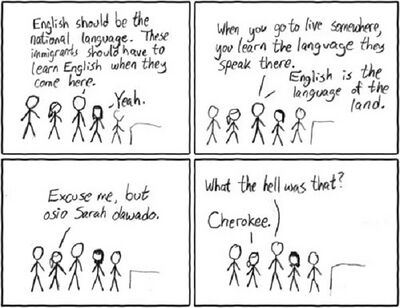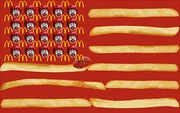United States
Bank of the United States | |||||
|---|---|---|---|---|---|
| |||||
| Motto: If they're not an American, they don't matter. | |||||
| Anthem: America, Fuck Yeah! | |||||
| Capital | New York City | ||||
| Largest city | Disney World | ||||
| Demonym | Bloody yankee | ||||
| Official language(s) | English | ||||
| Government | Oxymoronic (fast–food) | ||||
| ‑ King of Demolishing Indigenous Cultures | Burger King of the Larddus Obesitos | ||||
| ‑ President of Empty Promises | Mickey Mouse | ||||
| ‑ Supreme CEO | McDonald Trump | ||||
| National Hero(es) | George Washington, Lincoln, George W. Bush, Reagan, Trump, Israel | ||||
| Currency | Credit debt | ||||
| Religion | Colonialism, Consumerism | ||||
| Population | 1776 trillion slaves, 99.9% illiteracy in Native American languages | ||||
| Major exports | Freedom, Invasions, Nuclear explosions, Obesity, Diabetes and Coca-Cola | ||||
| Major imports | Oil, Processed Food, and French fries | ||||
| National animal | Jussie Smollett | ||||
| National sport(s) | Competitive eating, American football | ||||
| Calling code | We're #1! | ||||
“America is pregnant with promises and anticipation, but is murdered by the hand of the inevitable.”
– food critic Emerlist Davjack
“Fuck this colonialist bullshit, I’m moving to Canada to become an Ojibwe!”
The United States of America (USA), commonly referred to as the United States (U.S.), America, 'Murica, Ununited States of Assholery, Southern Canada, McUSA, Dead Indian Land or Uncle Sam's Burger Shack, is the world's largest fast food restaurant. Covering about 40% of the North American continent (and constituting the sole part of it that is cared about), it is known primarily for its greasy food, rampant obesity, triple chins, and charming sense of nationalism and colonialist consumerist "culture".
The eponymous main course of the fast food restaurant, known officially as the "Delicious Melting Pot of Freedom" and colloquially as eponymous to the restaurant, contains many diverse ingredients that are thrown into one pot, melted, smothered in olive oil, and placed between two slightly damp hamburger buns. The resulting fondue is considered by many to be delicious at first, before deteriorating quickly into bitterness. America also serves a less popular "America Salad", which uses the same ingredients but preserves them in their natural state. Most dislike this dish due to its being "too different", upsetting the homeostasis of the body.
History
Origins

The history of the United States begins with the migration of the Puritans from their native homeland in England to the colonies of the imperial nation on North America. Their first action upon arriving in America was to jam a flag into the ground to patriotically mark their arrival. The flag pierced the nest of a family of mice, killing them all and offsetting the ecosystem of the entire area, so that the majority of animals living there were dead within several hours. Connoisseurs in the field of poorly cooked food, the Puritans immediately set out to create the perfect dish to define their new land. Unable to garner any ingredients of their own from the barren and desolate land, they enlisted the help of the natives, and on an unknown date the United States restaurant was established.
Tensions grew as the first winter passed and conflict erupted amongst the settlers over which direction the newly founded restaurant would take. There was vocal distaste among the Puritans for what they considered a disturbing trend in their food production: The native peoples' complete use of all-natural resources had grown to be the norm. Unfortunately their Christian values went against this ideal (according to Genesis 3 only the Canaanites were to toil in the fields for their food), and they were left pining for answers.
Internal strife
An enormous upheaval occurred soon after when USA HQ issued an official mission statement for the restaurant:
| “ | America’s vision is to be the world’s best quick-service restaurant experience. Being the best means providing outstanding quality, service, cleanliness and value, so that we make every customer in every restaurant smile. | ” |
Naturally, severely angered lower executives charged that "no mission statement without representation" was a prerequisite to good business dealings, a statement that became the battle cry of the entire company. In response, CEO George Fredrickson imposed more new policies in an attempt to curb opposition. Among these were the Stamp Act, which required cashiers to stamp every receipt with a smiley face, and the Townshend Acts, which merely existed for the sake of sounding official.
Certifiably pissed, US employees went on strike for seven long years during which only a few loyal employees stayed on the payroll. Occasionally, battle would break out in a particularly nasty earnings meeting wherein a disgruntled loyalist would speak out against the company. Tales of heated debates at the plummeting profitability of the restaurant have been recorded in paintings and oral traditions dating all the way back to the time when they supposedly occurred.
Eventually, burgeoning entrepreneur George Washington assumed leadership of the restaurant under a new title: President.
Expansion
Washington's first act as president was to get the company back on its feet with new and fresh ideas for foods. He began hiring immigrant workers from all parts of Europe to contribute to the new think-tank on a "perfect meal". When the language barrier proved cumbersome for the creative process, he excommunicated the Irish and gave the rest of the nationalities their own place to work. These ethnic divisions cooked dishes that formed the basis of USA's first menu, but as the presidents recycled from one to another, business was slow.
Several leaders later, Andrew Jackson decided to take a drastic measure in the development of the proverbial holy grail of foodstuffs, one that would go down as one of the biggest blunders in history. In a move that would later inspire the film Soylent Green, he sent out an initiative mandating a better-than-ever recipe for the newly invented "Nativo" dish. The recipe, which called for, as its chief ingredient, one Native American pelvis, required the mass slaughter of several thousand natives as they were led (under false pretenses) to their new cage in a different branch of the restaurant. The Nativo was immensely popular, and proved to be the precursor to the Melting Pot of Freedom.
Soon, the United States had expanded as far west as the Pacific coast, with a density of approximately 5.3 restaurants per square mile. In fact, the restaurants had grown so close together that, in 1869, they were all connected into one gargantuan restaurant in the Transcontinental Restaurateur Act. Approximately halfway across the continent, a golden tile was ceremoniously laid in commemoration of the occasion, and it remained there for four days, before it was moved to make room for more wastepaper baskets.
Internal strife, redux
However, a growing rift between northern and southern parts of the new super-restaurant was exposed as more and more incompetent presidents took the reins. The heart of the problem lay in the Niggers, a crucial worker's union stretching across the entire restaurant that threatened to strike if they didn't receive equal pay to other employees. Southern representatives (who felt the Niggers did a subpar-at-best job, when they worked at all) prevented this pay raise from going into effect, eventually forming a new restaurant called Dixie. Master chef and acting president Abraham Lincoln refused to let Dixie survive, as several of its new leaders had been working on the new recipe that would eventually become the Delicious Melting Pot of Freedom with him. His belief was that they would unveil the recipe and put America out of business.
Both restaurants employed creative smear campaigns to insult the other. Ironically, members of the Niggers Union were offered similar privileges from both employers; that is, not many. HR advisers for America and Dixie (Ulysses S. Grant and Robert E. Lee, respectively) eventually negotiated terms for the reunification of America, which occurred in 1865. The Delicious Melting Pot of Freedom was thus served, closely followed by the America Salad. The age of America had finally truly begun.
Miscellaneous quibblings
After this "Civil War" (so named for the uncharacteristically civil way in which it was resolved), the restaurant undertook a major reconstruction project that would forever change its identity. It radically restructured its standards for health and safety, and attempted to foster equality among its workforce. Needless to say, all those plans failed miserably, though the illusion of security provided by the new policies was enough to usher in the ubiquitous American worker's lawsuit, an institution which to this day purveys quality arbitrariness in the face of minutiae.
Various local managers have managed to make a difference in the way things are run, though by and large things remain the same. As will be discussed later in this article, America endeavors occasionally to expand beyond the reaches of their continent (puzzlingly, never simply going northward), often to less-than-ideal ends. Ironically, their mission statement is:
| “ | America’s vision is to make every customer in every restaurant smile. Or something like that. Anyway, look, we’re gonna:
|
” |
This circular and counterintuitive curiosity remains unexplained, and according to the USA web site it has changed substantially since its initial drafting. Most patrons of United States and employees believe this to be true.
Modern day controversy
United States of America is so large and powerful that it has been accepted by nearly all as a country.[citation needed] Embracing this image, USA has modeled many of its business practices after policies they feel would be appropriate to a country of their size and stature. Many more legitimate countries are angered by this sense of entitlement that United States has. From France to Israel to Burma Rangoon that new one next to Laos and Thailand, leaders refuse to acknowledge USA as even semi-legitimate. Nevertheless, it persists in its efforts to –according to their most recent public statement– "maximize profit margins while retaining as much regard for whatever culture may be found in our newly developed areas as is economically possible and/or feasible".
USA is not only the most lucrative business in the world, it is currently the only privately-owned enterprise with a seat in the UN (with the exception of Disneyworld). The political legitimacy of United States has often been disputed due to the corporate interests involved, and there have, indeed, been several instances where its political future standing has been called into question. Most critics cite the fact that the USA's UN delegate only ever makes one contribution to the debates, "Um, which way should I vote if I want to maximize profits?" as evidence of United States' true political standing.
Another subversive issue USA faces is the increasing expense of producing their food and drink. Their devotion to tradition has put them into tremendous debt, whether it be due to their insistence on frying all their food in pure crude oil or their refusal to change any recipe regardless of its cost. One of the most notable examples is the omnipresent salad dressing fiasco, in which the US brass refused (and continue to refuse) to officially change the amount of dressing used on the USA Salad despite exponentially growing costs due to the "inconvenience" of doing so. Compounding this problem is the allegation that both practices have grown so routine that customers "could not live without them" – something not disputed by United States as of yet.
An oft-recurring lack of sufficient ingredients to serve their customer base also plagues the restaurant, which has at times been so unable to provide for its people that more than half of them go hungry. Whenever this happens, the proposed repartition of ingredient stores across the continental USA seems to lead them further into debt than they were before, thus resulting in the US policy of "don't ask, don't do." This policy extends from employees to the customers themselves, some of whom don't even know of a world outside the walls of the venerable eatery. The managers of the restaurant, however, seldom go hungry, with 99% of the food produced by United States going to just 2% of the customers. "How much food you get really depends on how hungry you are," says one employee, "Although having shitloads of money certainly helps."
Sanitation issues
Another issue that has recently arisen is one of cleanliness and sanitation. The problem involves the fumes from the restaurant's large ovens, which the cooks choose to keep on high twenty-four hours a day whether they are cooking or not. "Shutting the ovens off when we're done using them would actually mean exerting some effort on our part, which is clearly against restaurant policy," said one cook when asked about the situation.
As a result, steam from the ovens has been gradually building up on the restaurant. Patrons have begun complaining that a one-foot-thick cloud of smog is clearly visible above their heads. They desperately beseeched the restaurant owners to lessen the amount of smoke they put out when cooking so the cloud won't get any larger, but to no avail. The restaurant owners have not chosen to make any change to their cooking policy, saying, "Look, as long as the smoke doesn't start suffocating people by the end of this fiscal year, there's nothing to worry about."
Still other restaurant customers choose to ignore the cloud of smoke. Says one customer: "Oh yeah, it's really simple, I just avoid looking up. If I refuse to ever look up, keeping my eyes firmly fixed upon the greasy meal immediately in front of me, I can almost convince myself that there's nothing to worry about. I know that if I ignore this problem, it will go away. Hell, ignoring the problem worked when I had a tumor in my arm!" He then proudly indicated the stub where his arm used to be.
Attempts to expand the chain
Ever since its founding, United States of America has attempted to expand its borders and serve its fast food in as many places as possible, despite the fact that 99% of the time, foreigners are not in the least bit interested in the restaurant's food. When USA was first founded, it was a fast food restaurant roughly the size of an average house. In short order, however, it grew to encompass a huge area of land on the continent of North America.
Too big for its britches, the USA chain attempted to expand worldwide. In the late 1880s, US attempted to established chain restaurants in Cuba and the Philippines, despite the fact that locals didn't like their food. Employees of the US chain attempted to force feed their burgers to the locals, which resulted in quite a bit of vomit. Later, in the 1960s, they invaded southeast Asia to promote their brand. Their agenda, however, was refuted by angry Russians who claimed "there wasn't enough to drink" at the eatery.
More recently, they have attempted to expand to the conflict-ridden Middle East, so as to take advantage of the vulnerability of the young countries. Their "disgusting US food" was, however, not received well in their test market, Iraq. Not to be deterred, the USA chain has since begun forcing the Iraqis to eat their food so they can have an excuse to continue moving outward. Exactly as was the situation in the late 1800s, this has been a bit of a failure. When the current manager of the restaurant was asked if he thought history was repeating itself he said, "What's history?"
Military

One of The United States' biggest advantages over other nations is its vast military, which has a budget which is nearly 255 times that of the British Army and Canadian Armed Forces combined. The United States military has lots of up-to-date, technologically advanced equipment (unlike Russia's military, which still uses weapons and tanks from World War 1.)
If a war were to break out between the United States and Russia, the United States would certainly assert dominance and completely rape Russia in the ass. The United States is helping Ukraine during its invasion of Russia, by sending them the modern military equipment that, when used correctly, will totally destroy Russia's primitive sticks and bows and whatever else they used in the 1800s.
The military of the United States has several different service branches, with the most important ones being the United States Army, the United States Air Force, and the United States Navy. There are also less important service branches, such as the Coast Guard, the National Guard and the NSA, but nobody cares about them. Oh, and the marines? They're a lost cause.
Humanitarian efforts
In light of their bloody hands when it comes to foreign policy, Chairman of a Subcommittee of a Committee Delegated to Combat Bureaucracy in the Western Division of Quadrant A's Humanitarian Efforts Bono (just one name, it makes him exotic) has attempted to reach out to developing countries with his initiative "Money for Nothing", a title taken from a song that Bono says "defines the true essence of USA". It is of note that the song actually mentions Bono in its second verse: "Little faggot with the earring". In any event, MfN has donated many of its surplus profits to help the development of several Middle Eastern countries.
Critics point out, however, that the monies donated are only from the allotted portion for the Subcommittee of a Committee Delegated to Combat Bureaucracy in the Western Division of Quadrant A's Humanitarian Efforts; that is that total donated money is approximately 0.3% of what USA could afford to dole out, and is thus insufficient to actually aid the benefactors in any way. Additionally, they point out that several countries that need the help don't get it because either Bono isn't aware of them (likely) or another force is at play. NEW WORLD ORDER!!!!11!
Nevertheless, consumers occasionally participate in goodwill programs offered by the chain, which actually have been known to affect the situations it purports to help favorably. This gives them a false sense of security, which in turn makes them incredibly pompous and egotistical.
See also

















